Stay Up to Date
Submit your email address to receive the latest industry and Aerospace America news.
Jonathan Fentzke, 37, managing director at Techstars Allied Space Accelerator
Growing up in Hamburg, New York, a small town near Buffalo, no one told Jonathan Fentzke he could become a scientist. He planned to study industrial psychology until an aptitude test redirected him toward bachelor’s and master’s degrees in mechanical engineering at the Rochester Institute of Technology. Fentzke went on to earn a doctorate in aerospace engineering at the University of Colorado in Boulder. He became senior space scientist at Johns Hopkins University Applied Physics Laboratory before co-founding a suburban Washington, D.C., startup offering satellite imagery analysis. Now as the leader of the Techstars Allied Space Accelerator, Fentzke works with startups developing products or services to sell in the United States, Scandinavia and Western Europe.
Scientist to entrepreneur
I’ve always believed that both experience and rote learning are paths to intuition. As a result, I’ve spent the majority of my adult life pursing world travel and applying the math and physics I learn to developing what I hope are useful capabilities for space applications. My scientific career spanned about 15 years before I became an entrepreneur out of frustration. I continued to get more and more frustrated with how slowly the government was adopting new technologies and commercial off-the-shelf components. That led to starting a company called InSpace that turned into OmniEarth. After OmniEarth was acquired in 2017, I got much deeper into investing and mentoring other founders.
Highs and lows
Having 10 companies to mentor and a program team working tirelessly to support them means lots of adventures. It’s a pleasure to cheer when a company develops a new capability, gains a new customer or raises financing. In addition, when something goes wrong or not as expected, I’m there to offer advice or a shoulder to cry on.
Space in 2050
I think it would be awesome if we had legitimate diversity inclusion, if we had a meritocracy of ideas and people had access to opportunity. To get there, we need to start creating access to opportunity now. I would submit to you that in the next three solar cycles there will be no quantum technological leap. Things will be smarter, faster and more ubiquitous. There will be more satellites in space, providing more connectivity. While many hope for deep-space exploration by people, I hope for increased robotic exploration and a focus on improving life here on Earth. For if you were anywhere else in the known universe, I suspect Earth would be the most interesting planet with a very dynamic star (our sun) that one could find. … but maybe that will change by 2050.
About Debra Werner
A longtime contributor to Aerospace America, Debra is also a correspondent for Space News on the West Coast of the United States.
Related Posts
Stay Up to Date
Submit your email address to receive the latest industry and Aerospace America news.




